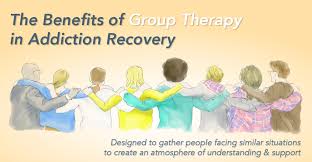Are You Considering Therapy?
Please do!
In fact, therapy in a group setting can be extremely helpful to people in addiction recovery. Group therapy enables members to develop a culture of recovery, and allows problems that usually accompany addiction, such as depression, isolation, and shame, to be treated. Groups can also act as a support network. Members of the group help you come up with practical ideas for improving difficult situations or tackling life challenges, but also hold you responsible throughout the recovery process.
What Is Group Therapy?
Group therapy is a form of psychotherapy that unites small groups of people who both challenge and support each other in addiction rehab and recovery. Group therapy is generally preferred over individual addiction therapy because groups offer family-like experiences. They provide the support and nurturing qualities that, at times, may have been lacking in group members’ families of origin.
The group also gives members the opportunity to practice healthy ways of interacting with their families and friends. In the hands of a skilled, well-trained group leader, the potential of all members in a group can be harnessed and directed towards:
– Healthy attachments
– Positive peer reinforcement
– Opportunities for self-expression
– Development social skills
What Is The Outcome Of Group Therapy?
The support group is a safe and non-judgmental environment where members can openly discuss their feelings, fears and frustrations. People who participate in group therapies benefit in many ways. Groups are uniquely customized to help people.
What Are The Benefits Of Group Therapy?
One of the benefits from group therapy is that it motivates members to initiate their own abstinence. Another benefit is that even when you say little, you will learn more about yourself during sessions by listening carefully to others. Finding that many people are bothered by the same concerns will make you think of solutions for problems in your life. The group members often bring up issues that can be solved collectively.
Yet another benefit is that you can decide how much you want to share with the group. No one can force you to do/say anything you are not ready to reveal. When you feel confident enough to share what is bothering you, the whole group will be very likely to help you and give you support.
Ultimately, the biggest benefit of group therapy is that it can influence the making of personal and lifestyle changes that support abstinence and help you maintain your sobriety more successfully.
What Is Group Therapy Like?
There are many things that can happen in group therapy. A session can be devoted to talking about the group’s concerns and how people are feeling. Group members might use the session to talk about a particular crisis or problem that needs solving. Or, they might want to focus on the changes that have been happening. Another possible topic for a group therapy session is coping skills, such as how to deal with anger, regret, or sadness. Sometimes just letting out feelings and talking about them in therapy sessions can bring relief, understanding, and healing.
The focus of a session might be on learning how to communicate more effectively with each other. For example, the therapist might coach a group member to speak up, to practice saying “no” to unreasonable demands, or to give a compliment. Group members might be asked to rephrase a statement in a more positive way. The therapist also might help group members improve their listening and observing skills to reduce misunderstanding.
Group therapies optimally involve 8-10 members, but the number can go up to 15. Groups can meet one time per week or up to 5 times weekly. Group therapy sessions usually last for about 90 minutes, while the duration of groups is never pre-set. You can stay in a therapy group for as long as you and your group leaders feel it’s beneficial for you.
Does Group Therapy Work To Treat Addiction?
Group therapy and substance use treatment are natural allies.
Groups provide positive peer support and pressure to abstain from their substances of choice. Unlike other addiction treatment programs, group therapy stimulates commitment in all group members to attend the sessions, be on time, and raise the effectiveness of the treatment itself. Therefore, both peer support and pressure for abstinence are strong.
The effectiveness of group therapy for addiction treatment can be attributed to the very nature of addiction and several co-occurring factors, such as:
– anxiety
– character pathology
– denial
– depression
– isolation
– temporary cognitive impairment
– personality disorders
– shame
– structural deficits
– a lack of a cohesive sense of self
All these problems are treated more successfully in group therapy settings than in individual therapy. Group therapy brings rewarding and therapeutic forces into people, and has a great capacity to bond members to treatment. So, the greater the amount, quality and duration of group therapy, the more success.
Here is a list of things that group therapy can provide for people in substance use treatment:
– Groups reduce the sense of isolation that most people who are struggling addiction experience.
– Groups enable participants to identify who is struggling with the same issues.
– Group increase people’s feelings of security.
– Groups can enhance member’s ability to share their experiences more freely.
– Groups enable people who are struggling addiction to witness the recovery of others. Groups provide people with more hope that they also can maintain abstinence.
– Groups allow a magnified witnessing of both the changes related to recovery.
– Groups provide insight in members’ intrapersonal and interpersonal changes.
How Effective Is Group Therapy For Addiction?
Very!
Group therapy is effective because people are fundamentally relational creatures. Also, our individual lives are shaped by the experiences in groups. Group therapy is an effective method that provides support for members in times of pain and trouble, and directs people to grow in creative and healthy ways.
